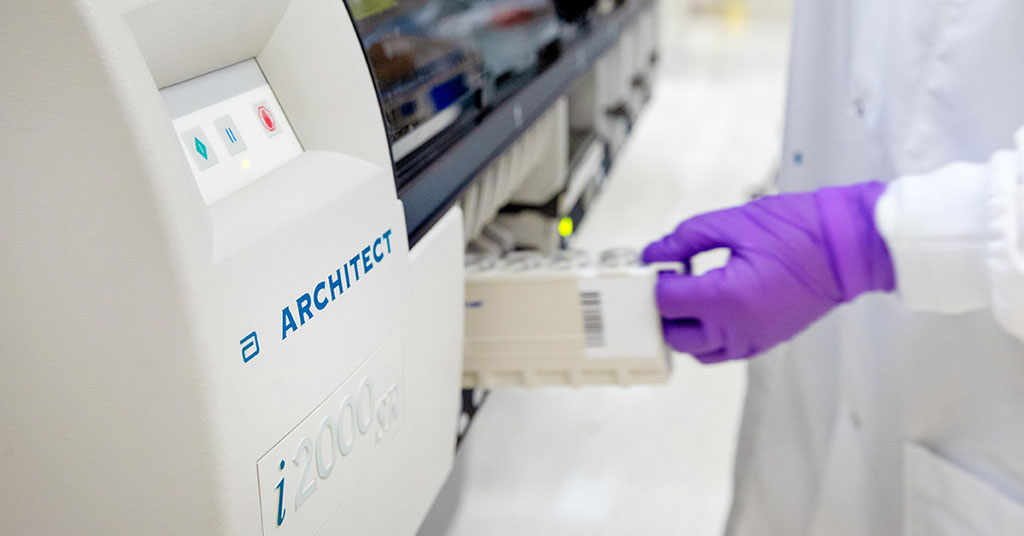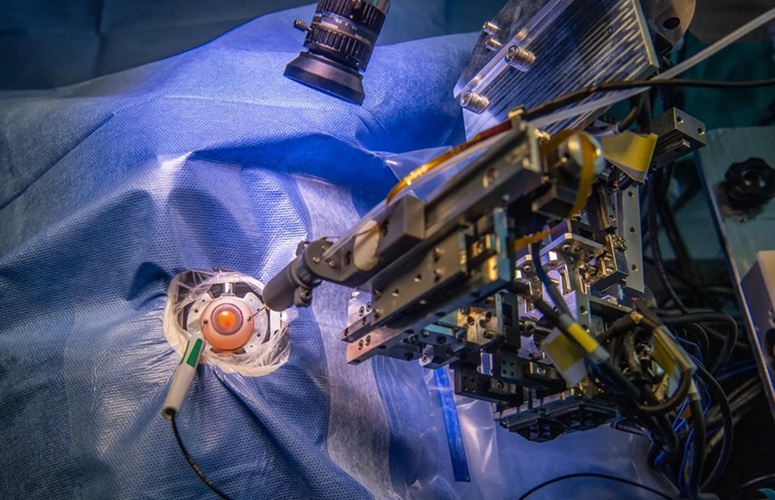Abbott Wins UK Government Contract to Supply Millions of Laboratory-Based IgG Antibody Tests
|
By HospiMedica International staff writers Posted on 23 May 2020 |

Image: Abbott`s ARCHITECT platform (Photo courtesy of Abbott)
Abbott (Lake Forest, IL, USA) has been awarded a government contract to supply millions of its laboratory-based IgG antibody tests to National Health Service (NHS) laboratories across the UK over the coming months.
Abbott's SARS-CoV-2 IgG test specifically identifies the IgG antibody, which is a protein that the body produces in the late stages of infection and may remain up to months and possibly years after a person has recovered. The test is designed to detect the IgG antibody specifically as it can better help physicians determine recovery from infection, versus looking at a combination of antibodies.
Abbott's IgG antibody test will be available at NHS laboratories across the UK, using its ARCHITECT i1000SR and i2000SR and Alinity i laboratory instruments. The ARCHITECT system can run up to 100-200 tests per hour to help hospitals and laboratories with reliable antibody testing during the pandemic.
Abbott has shipped 800,000 antibody tests to NHS laboratories, to be used as part of the testing initiative announced by the UK Secretary of State for Health. These tests, alongside the Abbott PCR tests already being used across the NHS, enable the company to support the UK with broad molecular and antibody testing during this pandemic.
"Abbott is proud to support the NHS' COVID-19 antibody testing strategy announced today, with agreement to supply antibody tests to NHS laboratories across the UK," said Mike Clayton, managing director, Northern Europe diagnostics, Abbott. "We have already delivered 800,000 tests to NHS laboratories, so they are prepared to deploy these tests, in line with government direction. Antibody testing is an important next step as we work to get back to our normal lives."
Abbott's SARS-CoV-2 IgG test specifically identifies the IgG antibody, which is a protein that the body produces in the late stages of infection and may remain up to months and possibly years after a person has recovered. The test is designed to detect the IgG antibody specifically as it can better help physicians determine recovery from infection, versus looking at a combination of antibodies.
Abbott's IgG antibody test will be available at NHS laboratories across the UK, using its ARCHITECT i1000SR and i2000SR and Alinity i laboratory instruments. The ARCHITECT system can run up to 100-200 tests per hour to help hospitals and laboratories with reliable antibody testing during the pandemic.
Abbott has shipped 800,000 antibody tests to NHS laboratories, to be used as part of the testing initiative announced by the UK Secretary of State for Health. These tests, alongside the Abbott PCR tests already being used across the NHS, enable the company to support the UK with broad molecular and antibody testing during this pandemic.
"Abbott is proud to support the NHS' COVID-19 antibody testing strategy announced today, with agreement to supply antibody tests to NHS laboratories across the UK," said Mike Clayton, managing director, Northern Europe diagnostics, Abbott. "We have already delivered 800,000 tests to NHS laboratories, so they are prepared to deploy these tests, in line with government direction. Antibody testing is an important next step as we work to get back to our normal lives."
Latest COVID-19 News
- Low-Cost System Detects SARS-CoV-2 Virus in Hospital Air Using High-Tech Bubbles
- World's First Inhalable COVID-19 Vaccine Approved in China
- COVID-19 Vaccine Patch Fights SARS-CoV-2 Variants Better than Needles
- Blood Viscosity Testing Can Predict Risk of Death in Hospitalized COVID-19 Patients
- ‘Covid Computer’ Uses AI to Detect COVID-19 from Chest CT Scans
- MRI Lung-Imaging Technique Shows Cause of Long-COVID Symptoms
- Chest CT Scans of COVID-19 Patients Could Help Distinguish Between SARS-CoV-2 Variants
- Specialized MRI Detects Lung Abnormalities in Non-Hospitalized Long COVID Patients
- AI Algorithm Identifies Hospitalized Patients at Highest Risk of Dying From COVID-19
- Sweat Sensor Detects Key Biomarkers That Provide Early Warning of COVID-19 and Flu
- Study Assesses Impact of COVID-19 on Ventilation/Perfusion Scintigraphy
- CT Imaging Study Finds Vaccination Reduces Risk of COVID-19 Associated Pulmonary Embolism
- Third Day in Hospital a ‘Tipping Point’ in Severity of COVID-19 Pneumonia
- Longer Interval Between COVID-19 Vaccines Generates Up to Nine Times as Many Antibodies
- AI Model for Monitoring COVID-19 Predicts Mortality Within First 30 Days of Admission
- AI Predicts COVID Prognosis at Near-Expert Level Based Off CT Scans
Channels
Critical Care
view channel
Light-Based Technology to Measure Brain Blood Flow Could Diagnose Stroke and TBI
Monitoring blood flow in the brain is crucial for diagnosing and treating neurological conditions such as stroke, traumatic brain injury (TBI), and vascular dementia. However, current imaging methods like... Read more
AI Heart Attack Risk Assessment Tool Outperforms Existing Methods
For decades, doctors have relied on standardized scoring systems to assess patients with the most common type of heart attack—non-ST-elevation acute coronary syndrome (NSTE-ACS). The GRACE score, used... Read moreSurgical Techniques
view channel
Robotic Assistant Delivers Ultra-Precision Injections with Rapid Setup Times
Age-related macular degeneration (AMD) is a leading cause of blindness worldwide, affecting nearly 200 million people, a figure expected to rise to 280 million by 2040. Current treatment involves doctors... Read more
Minimally Invasive Endoscopic Surgery Improves Severe Stroke Outcomes
Intracerebral hemorrhage, a type of stroke caused by bleeding deep within the brain, remains one of the most challenging neurological emergencies to treat. Accounting for about 15% of all strokes, it carries... Read morePatient Care
view channel
Revolutionary Automatic IV-Line Flushing Device to Enhance Infusion Care
More than 80% of in-hospital patients receive intravenous (IV) therapy. Every dose of IV medicine delivered in a small volume (<250 mL) infusion bag should be followed by subsequent flushing to ensure... Read more
VR Training Tool Combats Contamination of Portable Medical Equipment
Healthcare-associated infections (HAIs) impact one in every 31 patients, cause nearly 100,000 deaths each year, and cost USD 28.4 billion in direct medical expenses. Notably, up to 75% of these infections... Read more
Portable Biosensor Platform to Reduce Hospital-Acquired Infections
Approximately 4 million patients in the European Union acquire healthcare-associated infections (HAIs) or nosocomial infections each year, with around 37,000 deaths directly resulting from these infections,... Read moreFirst-Of-Its-Kind Portable Germicidal Light Technology Disinfects High-Touch Clinical Surfaces in Seconds
Reducing healthcare-acquired infections (HAIs) remains a pressing issue within global healthcare systems. In the United States alone, 1.7 million patients contract HAIs annually, leading to approximately... Read moreHealth IT
view channel
Printable Molecule-Selective Nanoparticles Enable Mass Production of Wearable Biosensors
The future of medicine is likely to focus on the personalization of healthcare—understanding exactly what an individual requires and delivering the appropriate combination of nutrients, metabolites, and... Read moreBusiness
view channel
Philips and Masimo Partner to Advance Patient Monitoring Measurement Technologies
Royal Philips (Amsterdam, Netherlands) and Masimo (Irvine, California, USA) have renewed their multi-year strategic collaboration, combining Philips’ expertise in patient monitoring with Masimo’s noninvasive... Read more
B. Braun Acquires Digital Microsurgery Company True Digital Surgery
The high-end microsurgery market in neurosurgery, spine, and ENT is undergoing a significant transformation. Traditional analog microscopes are giving way to digital exoscopes, which provide improved visualization,... Read more
CMEF 2025 to Promote Holistic and High-Quality Development of Medical and Health Industry
The 92nd China International Medical Equipment Fair (CMEF 2025) Autumn Exhibition is scheduled to be held from September 26 to 29 at the China Import and Export Fair Complex (Canton Fair Complex) in Guangzhou.... Read more

















